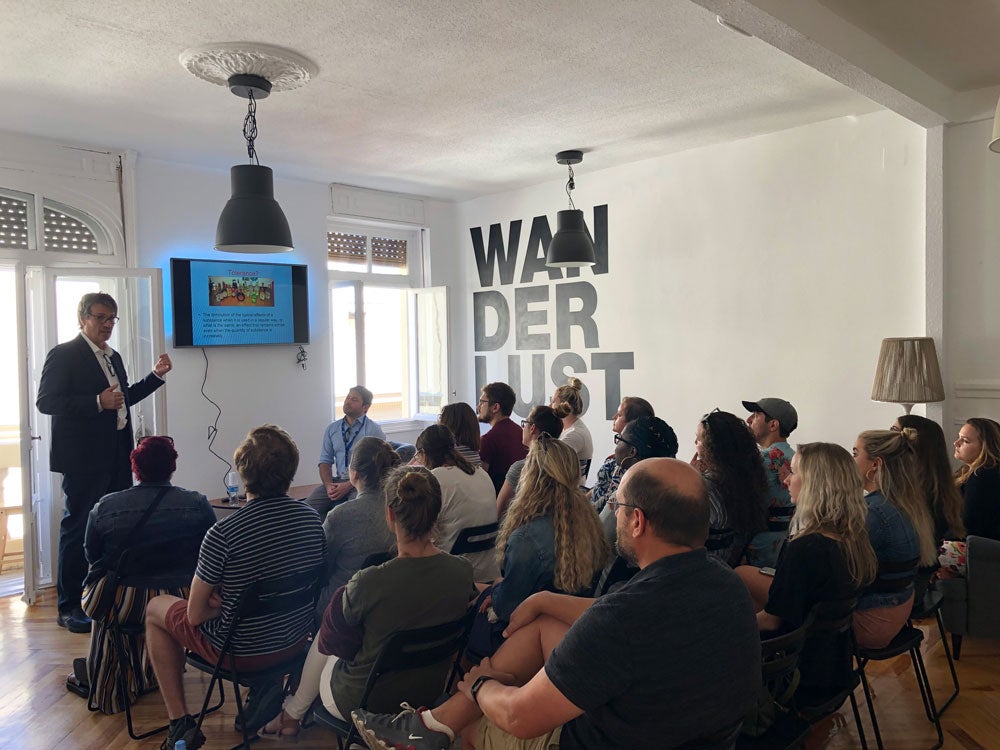ADDICTION & REHABILITATION
What can we learn from Portugal and Spain?
The first study abroad trip for ECU’s Department of Addictions and Rehabilitation studies gave a group of graduate students and a couple of faculty members new perspectives on drug policies, cultural norms and mental health.
The nine-day trip covered two cities each in Portugal and Spain, chosen because of their progressive substance use policies and their differing cultural views on drug and alcohol use.
Portugal decriminalized the use of all drugs in 2001. Spain has also decriminalized personal drug use and views alcohol consumption as a part of everyday life, said Dr. Leigh Atherton, director of the Master of Science in Clinical Counseling program and an organizer of the trip.
Seventeen master’s and PhD students were immersed in the cultures of Lisbon and Evora in Portugal, as well as Seville and Madrid in Spain, learning about the histories of the two countries through the lens of drug use and mental health. The experience included a lecture presented by Dr. José Miguel Gaona, director of the Neurosalus Treatment Center in Madrid, who provided the group insight into the Spanish views on the subject and how his center treats clients.

Dr. José Miguel Gaona, director of the Neurosalus Treatment Center in Madrid, provides students and faculty insight into the Spanish views on substance use, addiction and how his center treats clients.
Room for improvement in addictions counseling
Dr. Paul Toriello, professor and chair of the Department of Addictions and Rehabilitation Counseling in ECU’s College of Allied Health Sciences, emphasized the value of trips like these for the students. Because the field of addiction and rehabilitation counseling still has a lot of room for improvement, learning about the ways other countries are addressing these problems could help provide solutions at home, he said.
“Most people in the United States who need treatment don’t get it,” Toriello said. “Of the 20% that do go to treatment, success rates are still poor, so our students need to be thinking outside the box and come up with creative and innovative ways — even if they learn from another country — to try something different that can help somebody come out from the thumb of addiction and be a productive member of society.”
In addition to the potential of treating clients more effectively on an individual level, some graduates of the department will likely go on to help guide future policy changes.
“Exposing them only to what we do here would be a disservice,” Atherton said. “Being able to show them other models and the critical thinking skills of ‘this works there, how could we make something like this work here?’ Without that exposure, it’s kind of the same old thing being repeated.”
While students and faculty on the trip were able to gain a better understanding of the positive effects the policy changes were having on these countries — such as drops in overdose rates, drug-related crime and reductions in certain public health issues — they were also able to see the potential drawbacks of a culture so accepting of substances banned in other parts of the world.
“I concluded that it would be very challenging to be struggling with addiction and to have that be so open and accepted,” said Kate Macdonald, a first-year student in the Master of Science in Clinical Counseling program. “Whereas, I thought initially that it would be great that they don’t have the stigma associated with it that we do — which I believe is true — however, the opportunities to get clean and stay sober may not be as prevalent there since (drug use) is so accepted.”
Technology as a clinical tool
Students weren’t the only ones who gleaned some important takeaways from the experience. Toriello and Atherton noted the prevalence of integrating technology as a clinical tool.
“There’s a lot of technology these days in the realm of biofeedback,” Toriello said. “Basically, you plug a client into a computer program with a sensor on their earlobe or on their thumb and it captures the functioning of their fight-or-flight system, or what parts of their brain are firing or not firing and what that can mean in terms of stress or relaxation.”

Students and faculty visit the Plaza de Toros de Las Ventas, a famous bullring in Madrid.
Seeing a visual representation of their stress on a monitor can help patients to better recognize and learn to manage it without the aid of substances that they might normally turn to, Toriello said. And because the data doesn’t lie, biofeedback also helps to alleviate issues associated with inaccurate self-reporting from patients.
“If you’re in therapy or counseling for three months, there’s a perception that ‘I should be getting better because I’ve been coming here for three months,’ so the self-report is going to be muddied by that perception,” Atherton said. “They might think they should say they’re feeling less anxious even though they may not be.”
These techniques are used only selectively at bigger treatment centers in the United States, Toriello said, rather than as a standard of treatment as they’re used in Spain. Now, Toriello and Atherton are working to integrate biofeedback even more into their own curriculum.
Dr. Jon Rezek, ECU assistant vice chancellor for global affairs, said experiences like this trip push beyond learning a language or studying art—they address problems and policies.
“By seeing how other societies have dealt with these same problems, it opens up new possibilities and innovations for our students to explore,” Rezek said. “It helps our students become better and more innovative and creative engineers or doctors or policy makers or entrepreneurs.”
